- Home
- Lewis Carroll
Alice's Adventures in Wonderland & Through the Looking-Glass Page 12
Alice's Adventures in Wonderland & Through the Looking-Glass Read online
Page 12
"Never mind!" said the King, with an air of great relief. "Call the next witness." And, he added, in an undertone to the Queen, "Really, my dear, you must cross-examine the next witness. It quite makes my forehead ache!"
Alice watched the White Rabbit as he fumbled over the list, feeling very curious to see what the next witness would be like, "--for they haven't got much evidence yet," she said to herself. Imagine her surprise, when the White Rabbit read out, at the top of his shrill little voice, the name "Alice!"
XII
Alice's Evidence
Here!" cried Alice, quite forgetting in the flurry of the moment how large she had grown in the last few min utes, and she jumped up in such a hurry that she tipped over the jury-box with the edge of her skirt, upsetting all the jurymen on to the heads of the crowd below, and there they lay sprawling about, reminding her very much of a globe of gold-fish she had accidentally upset the week before.
"Oh, I beg your pardon!" she exclaimed in a tone of great dismay, and began picking them up again as quickly as she could, for the accident of the gold-fish kept running in her head, and she had a vague sort of idea that they must be collected at once and put back into the jury-box, or they would die.
"The trial cannot proceed," said the King, in a very grave voice, "until all the jurymen are back in their proper places--all," he repeated with great emphasis, looking hard at Alice as he said so.
Alice looked at the jury-box, and saw that, in her haste, she had put the Lizard in head downwards, and the poor little thing was waving its tail about in a melancholy way, being quite unable to move. She soon got it out again, and put it right; "not that it signifies much," she said to herself; "I should think it would be quite as much use in the trial one way up as the other."
As soon as the jury had a little recovered from the shock of being upset, and their slates and pencils had been found and handed back to them, they set to work very diligently to write out a history of the accident, all except the Lizard, who seemed too much overcome to do anything but sit with its mouth open, gazing up into the roof of the court.
"What do you know about this business?" the King said to Alice.
"Nothing," said Alice.
"Nothing whatever? " persisted the King.
"Nothing whatever," said Alice.
"That's very important," the King said, turning to the jury. They were just beginning to write this down on their slates, when the White Rabbit interrupted: "Unimportant, your Majesty means, of course," he said, in a very respectful tone, but frowning and making faces at him as he spoke.
"Unimportant, of course, I meant," the King hastily said, and went on to himself in an undertone, "important-- unimportant--unimportant--important----" as if he were trying which word sounded best.
Some of the jury wrote it down "important," and some "unimportant." Alice could see this, as she was near enough to look over their slates; "but it doesn't matter a bit," she thought to herself.
At this moment the King, who had been for some time busily writing in his note-book, called out "Silence!", and read out from his book, "Rule Forty-two. All persons more than a mile high to leave the court."
Everybody looked at Alice.
"I'm not a mile high," said Alice.
"You are," said the King.
"Nearly two miles high," added the Queen.
"Well, I sha'n't go, at any rate," said Alice: "besides, that's not a regular rule: you invented it just now."
"It's the oldest rule in the book," said the King.
"Then it ought to be Number One," said Alice.
The King turned pale, and shut his note-book hastily. "Consider your verdict," he said to the jury, in a low trembling voice.
"There's more evidence to come yet, please your Majesty," said the White Rabbit, jumping up in a great hurry: "this paper has just been picked up."
"What's in it?" said the Queen.
"I haven't opened it yet," said the White Rabbit; "but it seems to be a letter, written by the prisoner to--to somebody."
"It must have been that," said the King, "unless it was written to nobody, which isn't usual, you know."
"Who is it directed to?" said one of the jurymen.
"It isn't directed at all," said the White Rabbit: "in fact, there's nothing written on the outside." He unfolded the paper as he spoke, and added "It isn't a letter, after all: it's a set of verses."
"Are they in the prisoner's handwriting?" asked another of the jurymen.
"No, they're not," said the White Rabbit, "and that's the queerest thing about it." (The jury all looked puzzled.)
"He must have imitated somebody else's hand," said the King. (The jury all brightened up again.)
"Please your Majesty," said the Knave, "I didn't write it, and they ca'n't prove that I did: there's no name signed at the end."
"If you didn't sign it," said the King, "that only makes the matter worse. You must have meant some mischief, or else you'd have signed your name like an honest man."
There was a general clapping of hands at this: it was the first really clever thing the King had said that day.
"That proves his guilt, of course," said the Queen: "so, off with----."
"It doesn't prove anything of the sort!" said Alice. "Why, you don't even know what they're about!"
"Read them," said the King.
The White Rabbit put on his spectacles. "Where shall I begin, please your Majesty?" he asked.
"Begin at the beginning," the King said, very gravely, "and go on till you come to the end: then stop."
There was dead silence in the court, whilst the White Rabbit read out these verses:--
"They told me you had been to her,
And mentioned me to him:
She gave me a good character,
But said I could not swim.
He sent them word I had not gone
(We know it to be true):
If she should push the matter on,
What would become of you?
I gave her one, they gave him two,
You gave us three or more;
They all returned from him to you,
Though they were mine before.
If I or she should chance to be
Involved in this affair,
He trusts to you to set them free,
Exactly as we were.
My notion was that you had been
(Before she had this fit)
An obstacle that came between
Him, and ourselves, and it.
Don't let him know she liked them best,
For this must ever be
A secret, kept from all the rest,
Between yourself and me."
"That's the most important piece of evidence we've heard yet," said the King, rubbing his hands; "so now let the jury----"
"If any one of them can explain it," said Alice, (she had grown so large in the last few minutes that she wasn't a bit afraid of interrupting him,) "I'll give him sixpence. I don't believe there's an atom of meaning in it."
The jury all wrote down, on their slates, "She doesn't believe there's an atom of meaning in it," but none of them attempted to explain the paper.
"If there's no meaning in it," said the King, "that saves a world of trouble, you know, as we needn't try to find any. And yet I don't know," he went on, spreading out the verses on his knee, and looking at them with one eye; "I seem to see some meaning in them, after all. '--said I could not swim--' you ca'n't swim, can you?" he added, turning to the Knave.
The Knave shook his head sadly. "Do I look like it?" he said. (Which he certainly did not, being made entirely of cardboard.)
"All right, so far," said the King; and he went on muttering over the verses to himself: " 'We know it to be true'--that's the jury, of course--'If she should push the matter on'--that must he the Queen--'What would become of you?'--What, indeed!--'I gave her one, they gave him two'--why, that must be what he did with the tarts, you know----"
"But it goes on 'they all retu
rned from him to you'," said Alice.
"Why, there they are!" said the King triumphantly, pointing to the tarts on the table. "Nothing can be clearer than that. Then again--'before she had this fit'--you never had fits, my dear, I think?" he said to the Queen.
"Never!" said the Queen, furiously, throwing an inkstand at the Lizard as she spoke. (The unfortunate little Bill had left off writing on his slate with one finger, as he found it made no mark; but he now hastily began again, using the ink, that was trickling down his face, as long as it lasted.)
"Then the words don't fit you," said the King, looking round the court with a smile. There was a dead silence.
"It's a pun!" the King added in an angry tone, and everybody laughed. "Let the jury consider their verdict," the King said, for about the twentieth time that day.
"No, no!" said the Queen. "Sentence first--verdict afterwards."
"Stuff and nonsense!" said Alice loudly. "The idea of having the sentence first!"
"Hold your tongue!" said the Queen turning purple.
"I wo'n't!" said Alice.
"Off with her head!" the Queen shouted at the top of her voice. Nobody moved.
"Who cares for you?" said Alice (she had grown to her full size by this time). "You're nothing but a pack of cards!"
At this the whole pack rose up into the air, and came flying down upon her; she gave a little scream, half of fright and half of anger, and tried to beat them off, and found herself lying on the bank, with her head in the lap of her sister, who was gently brushing away some dead leaves that had fluttered down from the trees upon her face.
"Wake up, Alice dear!" said her sister. "Why, what a long sleep you've had!"
"Oh, I've had such a curious dream!" said Alice. And she told her sister, as well as she could remember them, all these strange Adventures of hers that you have just been reading about; and, when she had finished, her sister kissed her, and said "It was a curious dream, dear, certainly; but now run in to your tea: it's getting late." So Alice got up and ran off, thinking while she ran, as well she might, what a wonderful dream it had been.
But her sister sat still just as she left her, leaning her head on her hand, watching the setting sun, and thinking of little Alice and all her wonderful Adventures, till she too began dreaming after a fashion, and this was her dream:--
First, she dreamed about little Alice herself: once again the tiny hands were clasped upon her knee, and the bright eager eyes were looking up into hers--she could hear the very tones of her voice, and see that queer little toss of her head to keep back the wandering hair that would always get into her eyes--and still as she listened, or seemed to listen, the whole place around her became alive with the strange creatures of her little sister's dream.
The long grass rustled at her feet as the White Rabbit hurried by--the frightened Mouse splashed his way through the neighbouring pool--she could hear the rattle of the teacups as the March Hare and his friends shared their never-ending meal, and the shrill voice of the Queen ordering off her unfortunate guests to execution--once more the pig-baby was sneezing on the Duchess' knee, while plates and dishes crashed around it--once more the shriek of the Gryphon, the squeaking of the Lizard's slate-pencil, and the choking of the suppressed guinea-pigs, filled the air, mixed up with the distant sob of the miserable Mock Turtle.
So she sat on, with closed eyes, and half believed herself in Wonderland, though she knew she had but to open them again, and all would change to dull reality--the grass would be only rustling in the wind, and the pool rippling to the waving of the reeds--the rattling teacups would change to tinkling sheep-bells, and the Queen's shrill cries to the voice of the shepherd-boy--and the sneeze of the baby, the shriek of the Gryphon, and all the other queer noises, would change (she knew) to the confused clamour of the busy farm-yard--while the lowing of the cattle in the distance would take the place of the Mock Turtle's heavy sobs.
Lastly, she pictured to herself how this same little sister of hers would, in the after-time, be herself a grown woman; and how she would keep, through all her riper years, the simple and loving heart of her childhood; and how she would gather about her other little children, and make their eyes bright and eager with many a strange tale, perhaps even with the dream of Wonderland of long ago; and how she would feel with all their simple sorrows, and find a pleasure in all their simple joys, remembering her own child-life, and the happy summer days.
Through the Looking-Glass and What Alice Found There
PREFACE TO 1896 EDITION
As the chess-problem, given on the previous page, has puzzled some of my readers, it may be well to explain that it is correctly worked out, so far as the moves are concerned. The alternation of Red and White is perhaps not so strictly observed as it might be, and the "castling" of the three Queens is merely a way of saying that they entered the palace; but the "check" of the White King at move 6, the capture of the Red Knight at move 7, and the final "checkmate" of the Red King, will be found, by any one who will take the trouble to set the pieces and play the moves as directed, to be strictly in accordance with the laws of the game.
The new words, in the poem "Jabberwocky" (see p. 164), have given rise to some differences of opinion as to their pronunciation; so it may be well to give instructions on that point also. Pronounce "slithy" as if it were the two words "sly, the": make the "g" hard in "gyre" and "gimble": and pronounce "rath" to rhyme with "bath."
For this sixty-first thousand, fresh electrotypes have been taken from the wood-blocks (which, never having been used for printing from, are in as good condition as when first cut in 1871), and the whole book has been set up afresh with new type. If the artistic qualities of this reissue fall short, in any particular, of those possessed by the original issue, it will not be for want of painstaking on the part of author, publisher, or printer.
I take this opportunity of announcing that the Nursery "Alice," hitherto priced at four shillings, net, is now to be had on the same terms as the ordinary shilling picture-books--although I feel sure that it is, in every quality (except the text itself, in which I am not qualified to pronounce), greatly superior to them. Four shillings was a perfectly reasonable price to charge, considering the very heavy initial outlay I had incurred: still, as the Public have practically said, "We will not give more than a shilling for a picture-book, however artistically got-up," I am content to reckon my outlay on the book as so much dead loss, and, rather than let the little ones, for whom it was written, go without it, I am selling it at a price which is, to me, much the same thing as giving it away.
Christmas, 1896
INTRODUCTION.
Child of the pure unclouded brow
And dreaming eyes of wonder!
Though time be fleet, and I and thou
Are half a life asunder,
Thy loving smile will surely hail
The love-gift of a fairy-tale.
I have not seen thy sunny face,
Nor heard thy silver laughter;
No thought of me shall find a place
In thy young life's hereafter--
Enough that now thou wilt not fail
To listen to my fairy-tale.
A tale begun in other days,
When summer suns were glowing--
A simple chime, that served to time
The rhythm of our rowing--
Whose echoes live in memory yet.
Though envious years would say "forget."
Come, hearken then, ere voice of dread,
With bitter tidings laden,
Shall summon to unwelcome bed
A melancholy maiden!
We are but older children, dear,
Who fret to find our bedtime near.
Without, the frost, the blinding snow,
The storm-wind's moody madness--
Within, the firelight's ruddy glow
And childhood's nest of gladness,
The magic words shall hold thee fast:
Thou shalt not heed the raving blast.<
br />
And though the shadow of a sigh
May tremble through the story,
For "happy summer days" gone by,
And vanish'd summer glory--
It shall not touch with breath of bale,
The pleasance of our fairy-tale.
CHAPTER I.
LOOKING-GLASS HOUSE.
One thing was certain, that the white kitten had had nothing to do with it:--it was the black kitten's fault entirely. For the white kitten had been having its face washed by the old cat for the last quarter of an hour (and bearing it pretty well, considering); so you see that it couldn't have had any hand in the mischief.
The way Dinah washed her children's faces was this: first she held the poor thing down by its ear with one paw, and then with the other paw she rubbed its face all over, the wrong way, beginning at the nose: and just now, as I said, she was hard at work on the white kitten, which was lying quite still and trying to purr--no doubt feeling that it was all meant for its good.
But the black kitten had been finished with earlier in the afternoon, and so, while Alice was sitting curled up in a corner of the great arm-chair, half talking to herself and half asleep, the kitten had been having a grand game of romps with the ball of worsted Alice had been trying to wind up, and had been rolling it up and down till it had all come undone again, and there it was, spread over the hearth-rug, all knots and tangles, with the kitten running after its own tail in the middle.
"Oh, you wicked, wicked little thing!" cried Alice, catching up the kitten and giving it a little kiss to make it understand that it was in disgrace. "Really, Dinah ought to have taught you better manners! You ought, Dinah, you know you ought!" she added, looking reproachfully at the old cat, and speaking in as cross a voice as she could manage--and then she scrambled back into the arm-chair, taking the kitten and the worsted with her, and began winding up the ball again. But she didn't get on very fast, as she was talking all the time, sometimes to the kitten, and sometimes to herself. Kitty sat very demurely on her knee, pretending to watch the progress of the winding, and now and then putting out one paw and gently touching the ball, as if it would be glad to help if it might.

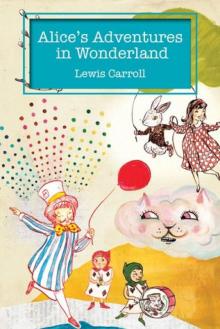 Alice's Adventures in Wonderland & Through the Looking-Glass
Alice's Adventures in Wonderland & Through the Looking-Glass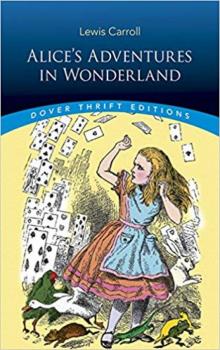 Alice's Adventures in Wonderland
Alice's Adventures in Wonderland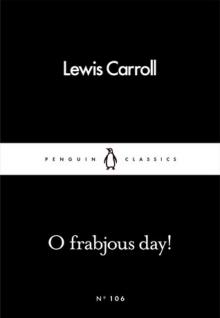 O Frabjous Day!
O Frabjous Day!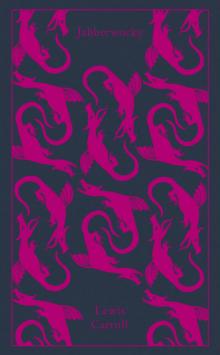 Jabberwocky and Other Nonsense
Jabberwocky and Other Nonsense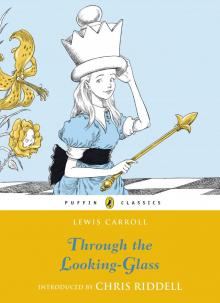 Through the Looking-Glass and What Alice Found There
Through the Looking-Glass and What Alice Found There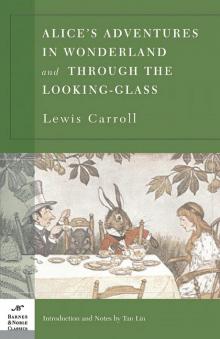 Alice's Adventures in Wonderland and Through the Looking Glass (B&N)
Alice's Adventures in Wonderland and Through the Looking Glass (B&N)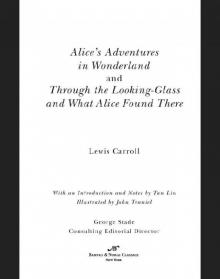 Alice's Adventures in Wonderland and Through the Looking Glass (Barnes & Noble Cla
Alice's Adventures in Wonderland and Through the Looking Glass (Barnes & Noble Cla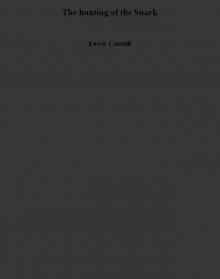 The hunting of the Snark
The hunting of the Snark The Complete Alice in Wonderland (Wonderland Imprints Master Editions)
The Complete Alice in Wonderland (Wonderland Imprints Master Editions)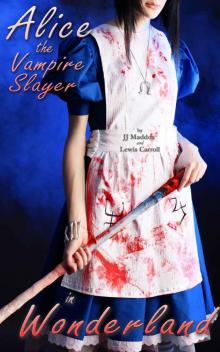 Alice in Wonderland: The Vampire Slayer
Alice in Wonderland: The Vampire Slayer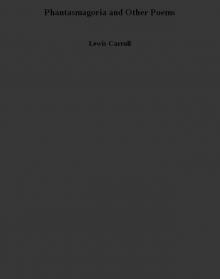 Phantasmagoria and Other Poems
Phantasmagoria and Other Poems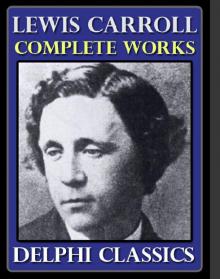 Complete Works of Lewis Carroll
Complete Works of Lewis Carroll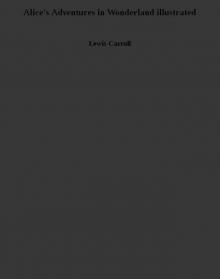 Alice's Adventures in Wonderland illustrated
Alice's Adventures in Wonderland illustrated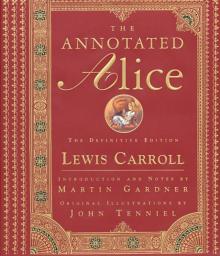 The Annotated Alice: The Definitive Edition (The Annotated Books)
The Annotated Alice: The Definitive Edition (The Annotated Books) Through the Looking Glass
Through the Looking Glass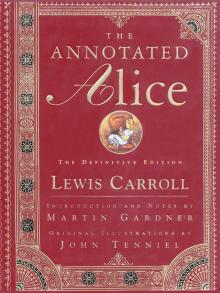 The Annotated Alice
The Annotated Alice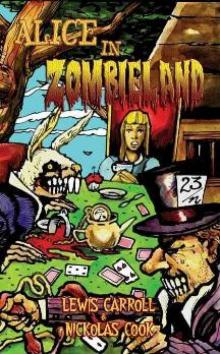 Alice in Zombieland
Alice in Zombieland